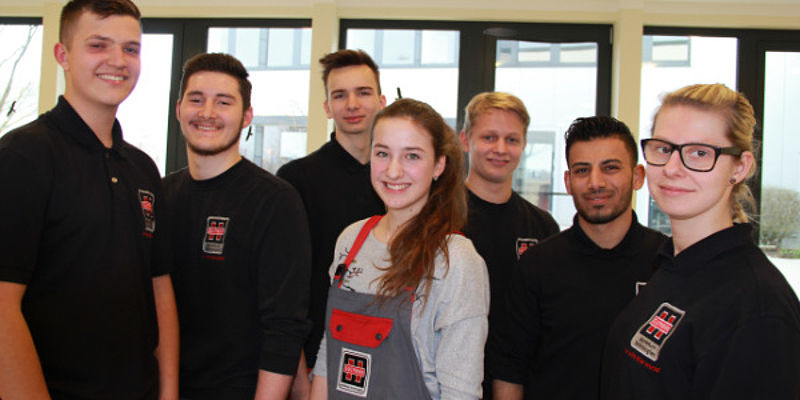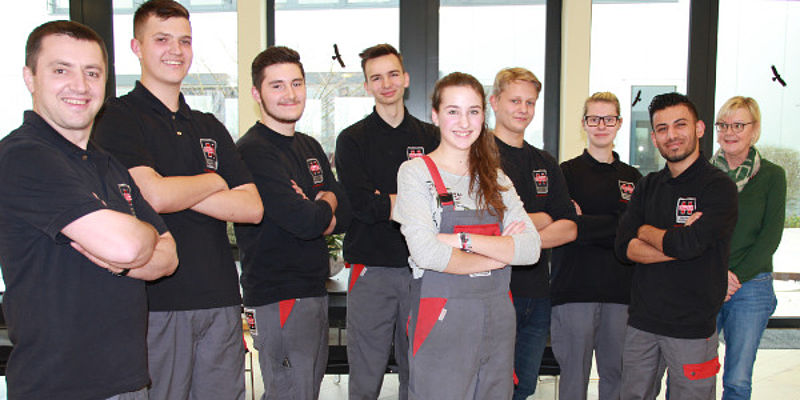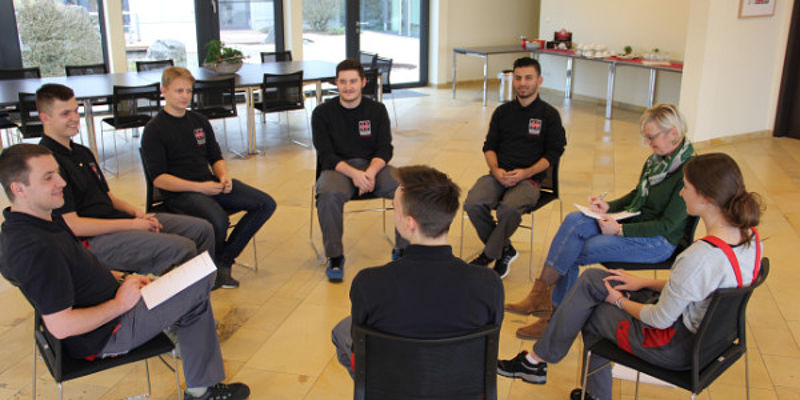Training case studies: diverse perspectives at GAD
News
Seven GAD apprentices tell Claudia Salbaum what it's like to work here and what their hopes are for the future.
Training case studies: diverse perspectives at GAD
Trainees at GAD, February 2018: we feel accepted and feel that our concerns are acted on quickly
The following trainees took part in this discussion: Amil Aga, Laura Felleiter, Stefanie Ferber, Muhammad Alhanash, Marc Underberg, David Renner and Marko Tmusic. The discussion was led by Claudia Salbaum from corporate affairs. Also present was Tahir Ljiko, who is responsible for works preparation. GAD provides training for the following careers:
- Commercial procurement
- Storage logistics
- Machinery and equipment manager, wire and cable technology
A special feature of the of the apprentice programme is that, in addition to the core training, apprentices are also exposed to other areas of the business and are given the opportunity to get involved. In addition to practical training, theory is also taught on a weekly basis. Content is presented by trainers by way of formal presentations and, with specific questions being posed by trainers, apprentices can continually measure their progress towards key learning aims. The training programme can also involve short-term placements in other areas of the business. Sometimes this can mean the apprentices' core skills training is interrupted. This is a problem we are currently looking to resolve.
In addition to the formal apprenticeship programme, GAD also hosts school visits, during which the apprentices give presentations to pupils on their chosen career path. This initiative is part of the MAP project organised by the HERMANN GUTMANN FOUNDATION. During annual hands-on job fairs, which also take place under the auspices of the Foundation, and during the apprenticeship fair (BAM), GAD trainees give live demonstrations of skills such as wire pulling and they explain – and show – to school pupils what being an apprentice involves. These events have already encouraged some pupils to sign up as interns or apprentices with GAD.
In writing up these interviews, we have summarised the most relevant parts of the apprentices' responses as a group, so that their answers do no reveal too much of their own personal opinions and observations. At the end of the interview, the apprentices were of the view that this had been a useful opportunity to express their views. They valued the interest showed in their opinions and saw the discussion as further proof of that fact that, at GAD, it's not just about how well you do your job. Coming together as a group can be just as important.
Why did you choose to train for this specific profession here at GAD?
After finishing school, some trainees weren't sure what professions they wanted to train for. They therefore did internships with a wide range of firms for an equally wide range of professions. At this point, for these GAD trainees, it was less about the money and more about the experience they could gain.
Why did you apply to GAD specifically?

Wir Azubis freuen uns, dass wir gehört werden (von links nach rechts: Amil Aga, Marko Tmusic, Marc Underberg, Laura Felleiter, David Renner, Muhammad Alhanash, Stefanie Ferber)

Ganz links dabei: Tahir Ljiko, u. a. Fertigungssteuerung. Ganz rechts: Claudia Salbaum, Buchhaltung, Interviewerin

Im Kreis können wir offen miteinander reden
Some of the trainees had already done an internship at GAD and everyone who had done so quickly felt at home here. Another important factor was that, for each of the seven GAD trainees, GAD was offering exactly the apprenticeship that, given their placement experiences, they knew they wanted to pursue. Ultimately it was because their placement had been so positive that they knew they wanted to work at GAD and could be confident of being offered a training contract.
What did you expect when you began your training?
All seven of the apprentices saw their training as a personal challenge and they appreciated the diversity of the programme, not least because, beyond the basic training, there was the opportunity for further learning.
How did you adapt to working life?
All seven of the apprentices found it a very positive experience, as right from the start they were all involved in day-to-day operations. At the end of each day, the trainees could see what they had accomplished. And because of the confidence that their new colleagues had in them, they quickly learned to feel trusted. The one aspect of working life that all seven found difficult in the first weeks was going from purely intellectual learning at school to the physical rigours of the workplace.
In your current job, what came as a pleasant surprise and what was less welcome?
The apprentices particularly appreciated the friendliness of their colleagues combined with a genuine interest in how they were getting on. "How are you doing today?" was a question frequently asked by their more experienced colleagues. Everyone knows everyone's name, which helps to create a friendly environment. The apprentices also learned important people skills, such as trust: to what extent can they be truly open, and with whom? Something the apprentices found difficult was performing demanding tasks of which they had no prior experience.
How much contact do you have with one another and how much do you share your experiences? Do you provide one another with mutual support?
If we don't help one another, who will? was the main sentiment expressed. That is also the case at technical college, where apprentices with more experience give advice to the newcomers. Lunch breaks in the canteen are also a good opportunity for apprentices to get together.
Does technical school help with practical tasks in the workplace, or is it more about learning the theory?
At technical school, the apprentices often engage with topics that they may not be able to implement like-for-like in the workplace, as theory and practice are often quite different. Nonetheless all the apprentices appreciate the value of an academic training that gives them a basic grounding. This might include classroom material provided by other companies or tours through other companies' premises, where processes and operational practices are different from those at GAD.
Is there anything particularly special about your training?
At GAD, apprentices appreciate the opportunity to gain an insight into areas that are not directly related to the training programme. A commercial trainee will learn about the equipment, processes and products used in manufacturing, while technical or logistics apprentices will get the opportunity to see what the sales or administration department is planning.
What are your plans for after your apprenticeship?
Plans for the future tend to vary widely. Most apprentices are focused on completing their training before thinking about what to do next. Those who are considering further training might go on to do evening courses. Here it is important that apprentices give some thought to how they will be able to use their knowledge later within the firm and whether the role that they want will be available for them here.
What do you need from GAD once your apprenticeship is finished?
GAD will of course take all possible steps to ensure that apprentices can find work in the company in accordance with their skills and knowledge. Realistically, however, that is not always possible, as the right job might not always be available at the right time and operational requirements have to come first. All the apprentices want to be asked as early as possible which area of GAD they would like to work in. This conversation would include being told early on whether, and in what areas, the company could imagine them working at GAD. Every apprentice has their own personal preferences and ambitions that they hope GAD will be able to accommodate.
